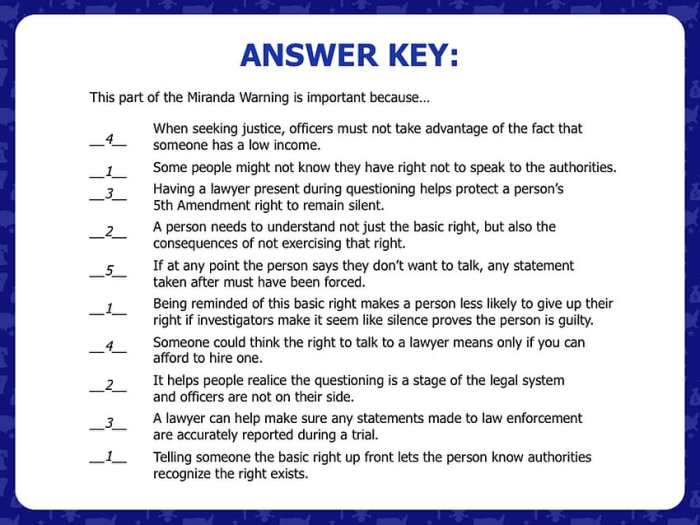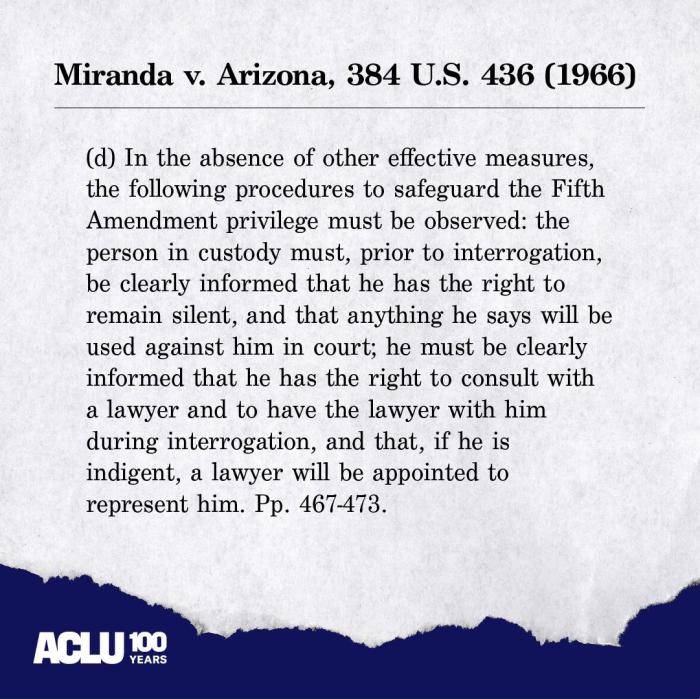Miranda v arizona icivics answer key – The Miranda v. Arizona I Civics Answer Key unlocks the intricacies of a landmark Supreme Court ruling that transformed criminal justice practices. This comprehensive guide delves into the case’s origins, legal significance, and ongoing debates, providing a profound understanding of the Fifth Amendment’s protection against self-incrimination.
The case of Ernesto Miranda’s arrest and interrogation brought forth crucial questions about the rights of suspects and the limits of police authority. The Supreme Court’s decision in Miranda v. Arizona established the now-famous Miranda warnings, safeguarding individuals from coerced confessions and ensuring the integrity of the criminal justice system.
Miranda v. Arizona: An Overview

The Miranda v. Arizona case, decided by the U.S. Supreme Court in 1966, is a landmark decision that established the Fifth Amendment right against self-incrimination and the Sixth Amendment right to counsel during custodial interrogation. The case arose from the arrest of Ernesto Miranda in Phoenix, Arizona, for kidnapping and rape.
During Miranda’s interrogation, the police used coercive techniques to extract a confession from him. The Supreme Court ruled that the police violated Miranda’s constitutional rights by failing to inform him of his right to remain silent and his right to an attorney.
The Court held that these warnings must be given to suspects before any custodial interrogation can begin.
Supreme Court Ruling
In a 5-4 decision, the Supreme Court ruled that the Fifth Amendment right against self-incrimination and the Sixth Amendment right to counsel are violated when a suspect is subjected to custodial interrogation without being informed of their rights. The Court held that these rights are fundamental to a fair trial and that the police must take steps to protect them.
The Court’s ruling in Miranda v. Arizona has had a significant impact on criminal justice practices. The Miranda warnings are now required to be given to suspects before any custodial interrogation can begin. This has helped to ensure that suspects are aware of their rights and that their confessions are not coerced.
Fifth Amendment Rights, Miranda v arizona icivics answer key
The Fifth Amendment to the U.S. Constitution protects citizens against self-incrimination. This means that no one can be compelled to testify against themselves in a criminal case. The Miranda warnings protect this right by informing suspects that they have the right to remain silent and that anything they say can be used against them in court.
The Miranda warnings have been used to prevent self-incrimination in numerous cases. For example, in the case of Miranda v. Arizona, the Supreme Court ruled that Miranda’s confession was inadmissible because he was not informed of his right to remain silent.
This ruling has helped to ensure that suspects are aware of their rights and that their confessions are not coerced.
Criticisms and Controversies
The Miranda decision has been criticized by some for being too protective of criminals. Critics argue that the Miranda warnings make it more difficult for the police to solve crimes and that they allow guilty suspects to escape punishment. However, supporters of the Miranda decision argue that it is essential to protect the rights of suspects and to ensure that confessions are not coerced.
The Miranda decision remains a controversial issue today. There are ongoing debates about whether the Miranda warnings are too protective of criminals and whether they should be modified or eliminated.
Miranda Warnings in Practice
The Miranda warnings are a set of four statements that must be given to suspects before any custodial interrogation can begin. The warnings are as follows:
- You have the right to remain silent.
- Anything you say can and will be used against you in a court of law.
- You have the right to an attorney. If you cannot afford an attorney, one will be appointed to you.
- You have the right to stop answering questions at any time.
The Miranda warnings must be given in a clear and understandable manner. The suspect must be given an opportunity to read and understand the warnings before any questioning can begin. If the suspect does not understand the warnings, they cannot be used against them in court.
The consequences of failing to provide Miranda warnings can be severe. If a suspect is not given the Miranda warnings, any statements they make during interrogation can be suppressed in court. This can make it difficult for the prosecution to prove its case, and it can result in the dismissal of charges.
FAQ Resource: Miranda V Arizona Icivics Answer Key
What are the key elements of the Miranda warnings?
The Miranda warnings inform suspects of their right to remain silent, their right to an attorney, and that any statements they make can be used against them in court.
How do the Miranda warnings protect the Fifth Amendment?
The Miranda warnings ensure that suspects are aware of their right against self-incrimination, preventing them from making involuntary confessions that could be used to convict them.
What are some criticisms of the Miranda decision?
Critics argue that the Miranda warnings hinder effective law enforcement by making it more difficult to obtain confessions and that they protect guilty individuals from being held accountable for their crimes.

